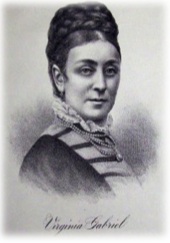Virginia Gabriel facts for kids
Mary Anne Virginia Gabriel (born February 7, 1825 – died August 7, 1877) was a well-known English singer and composer. She was also known as Mrs. George E. March after she got married.
A Life in Music
Virginia Gabriel was born in Banstead, Surrey, England. Her father was Major-general "Archangel" Gabriel. From a young age, Virginia showed a great talent for music. She learned to play the piano from famous teachers like Johann Peter Pixis, Theodor Dohler, Sigismond Thalberg, and Bernhard Molique. She also studied how to compose music with Saverio Mercadante, who was an opera composer.
In 1870, Virginia Gabriel spent a long time at Glamis Castle in Scotland. While she was there, she heard and shared many stories about a "secret" in the castle. These stories were often about a mysterious person known as the Monster of Glamis.
Virginia became very famous for writing popular songs called ballads. In the 1800s, it was common for women to be songwriters, so she had no trouble getting her songs published. However, it was harder for her to find publishers for her more serious musical works, like her longer pieces called cantatas. For example, she had to pay to publish her cantata Dreamland herself. Even though her songwriting style was often Romantic (meaning it focused on feelings and imagination), her songs always showed her skill and creativity. This was because she was also a very strong serious composer.
In 1874, Virginia married George March, who wrote the words for her musical works (called a librettist). He worked for the Foreign Office. Sadly, in 1877, a newspaper called The Times reported that she died from "injuries sustained by a fall from a carriage." Her obituary in the Evening Post newspaper said that she was "much liked in Society" and had "...a kindness of heart."
Musical Works
Virginia Gabriel was known for writing many different types of music. She composed cantatas, which are like short operas without acting. She also wrote full operas and many songs.
Some of her important works include:
- Evangeline (1873) – a cantata
- Graziella (1870) – a cantata
- Dreamland (1870) – a cantata
- Widows Bewitched (1865) – an opera
- A Quiet Chateau (1867) – an opera
- Who's The Heir? (1868) – an opera
- Lost and Found (1870) – an opera
- The Lion's Mouth – a light opera (opera bouffe)
- Change upon change (words by Elizabeth Barrett Browning) – a song
- Oh, wilt thou have my hand, Dear (words by Elizabeth Barrett Browning) – a song
- Orpheus With His Lute (words by John Fletcher) – a song
- At the Window (words by Robert Browning) – a song
- A Mother's Song – a song
- Don't Forget Me Quite (words by Mrs Francis Anne Kemble) – a song
- Ruby – a song
- When Sparrows Build (words by Jean Ingelow) – a song
- Light through Darkness (from the cantata: Dreamland) – a song
- Chloe sat beside the River (from the opera: Widows Bewitched) – a song
- The Golden Wedding Day – a song
- The Fisherman's Widow – a song for a contralto voice
- I will arise – a sacred song
 | Ernest Everett Just |
 | Mary Jackson |
 | Emmett Chappelle |
 | Marie Maynard Daly |


